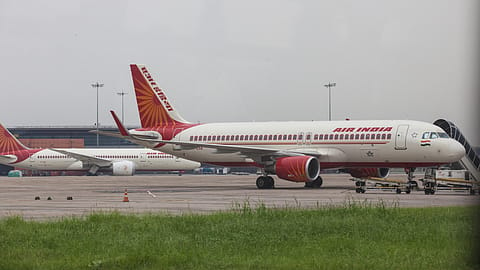Middle East crisis: Air India grounds Tel Aviv flights, skirts Iranian airspace
The new flight paths are longer and will increase operational costs for carriers, potentially leading to higher airfares.

Amid the escalating tensions in the Middle East, Air India has temporarily halted its flights to Tel Aviv, and the airline is rerouting flights to avoid Iranian airspace. The aviation industry faced chaos after Iran launched over 300 missiles and drones at Israel, with most of them being intercepted by Israel's U.S.-supported missile defence system. Over the past two days, around twelve airlines, including Air India, Australia's Qantas, Germany’s Lufthansa, United Airlines, and others had to cancel or redirect their flights.
The new flight paths are longer and will increase operational costs for carriers, potentially leading to higher airfares. Air India, Vistara, IndiGo, and other international airlines are opting for alternative routes to the West to steer clear of Iranian airspace. Pilots are encountering more GPS signal interference in conflict areas, forcing route planners to constantly adjust paths for safety.
To bypass Iranian airspace, airlines are adding fuel stops to some nonstop flights between West and South Asia, including India. Air India's San Francisco-Mumbai flight had to divert to Dubai for refuelling due to the longer route taken. While Air India has suspended its Tel Aviv route, Iranian airline Mahan Air continues its Delhi-Tehran flights, affecting Indian carriers' operations. Swiss Air's nonstops to Delhi will now stop in Vienna for refuelling, affecting flights to Delhi and Mumbai, but not to South India.
U.S. carriers have long avoided Iranian airspace, unaffected by recent issues. Pilots note that these alternative routes are lengthening flight durations by about half an hour, increasing operational costs and possibly leading to higher airfares passed on to passengers.
Apart from closing the Israeli airspace, neighbouring countries such as Iraq, Jordan, and Lebanon also shut down, keeping potential attacks in mind. These attacks typically occur during the night, leading to the reopening of airspace during daylight hours.
On Sunday, prominent Middle Eastern airlines such as Emirates Airlines, Qatar Airways, and Etihad Airways announced their plans to resume operations in the region after either cancelling or redirecting some flights.
Iran launched the attack on Israel in retaliation for a suspected Israeli strike on its consulate in Damascus on April 1, resulting in the deaths of seven Iranian Revolutionary Guards, including two generals.